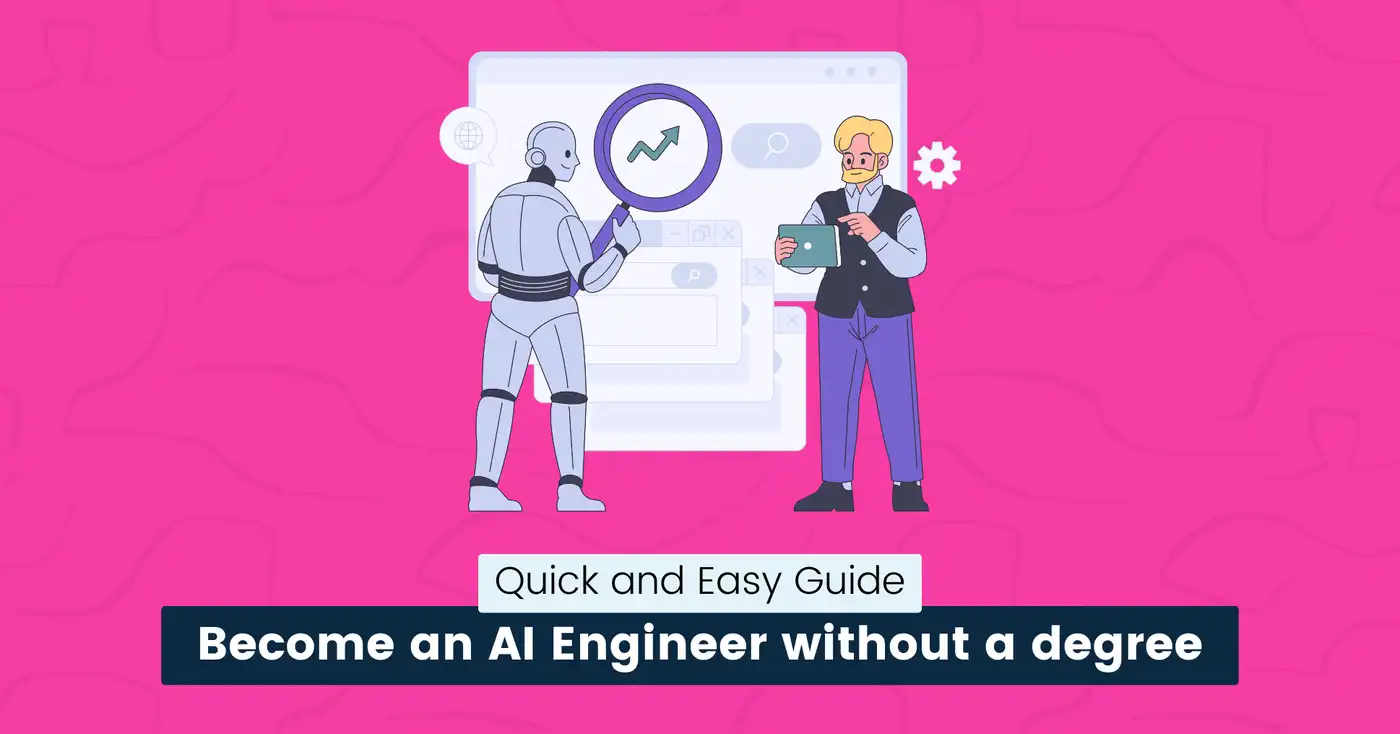
How to become an AI Engineer without a degree (2024)
As AI (Artificial intelligence) becomes more common, the demand for AI engineers is rising.
However, you may wonder if becoming an AI engineer without a degree is possible.
The good news is, yes, it is possible. But, How?
Read this guide, and you will learn:
- What is AI Engineering and Impacts
- Role of AI Engineer
- Technical and Soft Skills for AI Engineers
- How to get started in AI Engineering? The 5 Steps
- How Long Does It Take to Become an AI Engineer?
What is the Field of AI Engineering?
To understand AI engineering, it’s important to have a solid grasp of the key concepts and technologies involved.
AI engineering involves developing and implementing AI applications using machine learning algorithms and techniques.
Machine learning is a subset of AI that focuses on developing algorithms that enable computers to learn from data and make predictions or decisions based on that data.
Data science plays a crucial role in AI engineering. It involves analyzing and interpreting data to get insights and develop models.
Computer vision is another important aspect of AI engineering. It involves developing algorithms and techniques to enable computers to understand and interpret visual data such as images and videos.
This technology has significant applications in facial recognition, object detection, and autonomous vehicles.
snappify will help you to create
stunning presentations and videos.
AI and Its Impact on Industries
AI is a field of computer science that aims to develop intelligent machines that can replicate human-like behavior and perform tasks that typically require human intelligence.
AI has the potential to transform various industries by automating processes, improving efficiency, and enabling better decision-making.
AI can help organizations make:
- Data-driven decisions
- Optimize operations
- Enhance customer experiences
It can analyze large volumes of data to identify patterns and trends, leading to more accurate predictions and insights.
In the healthcare industry, AI can assist in diagnosing diseases, analyzing medical images, and developing personalized treatment plans.
It has the power to revolutionize industries and improve people’s lives globally.
As an AI engineer, you will be crucial in developing and implementing AI technologies that significantly impact various sectors.
Role of an AI Engineer
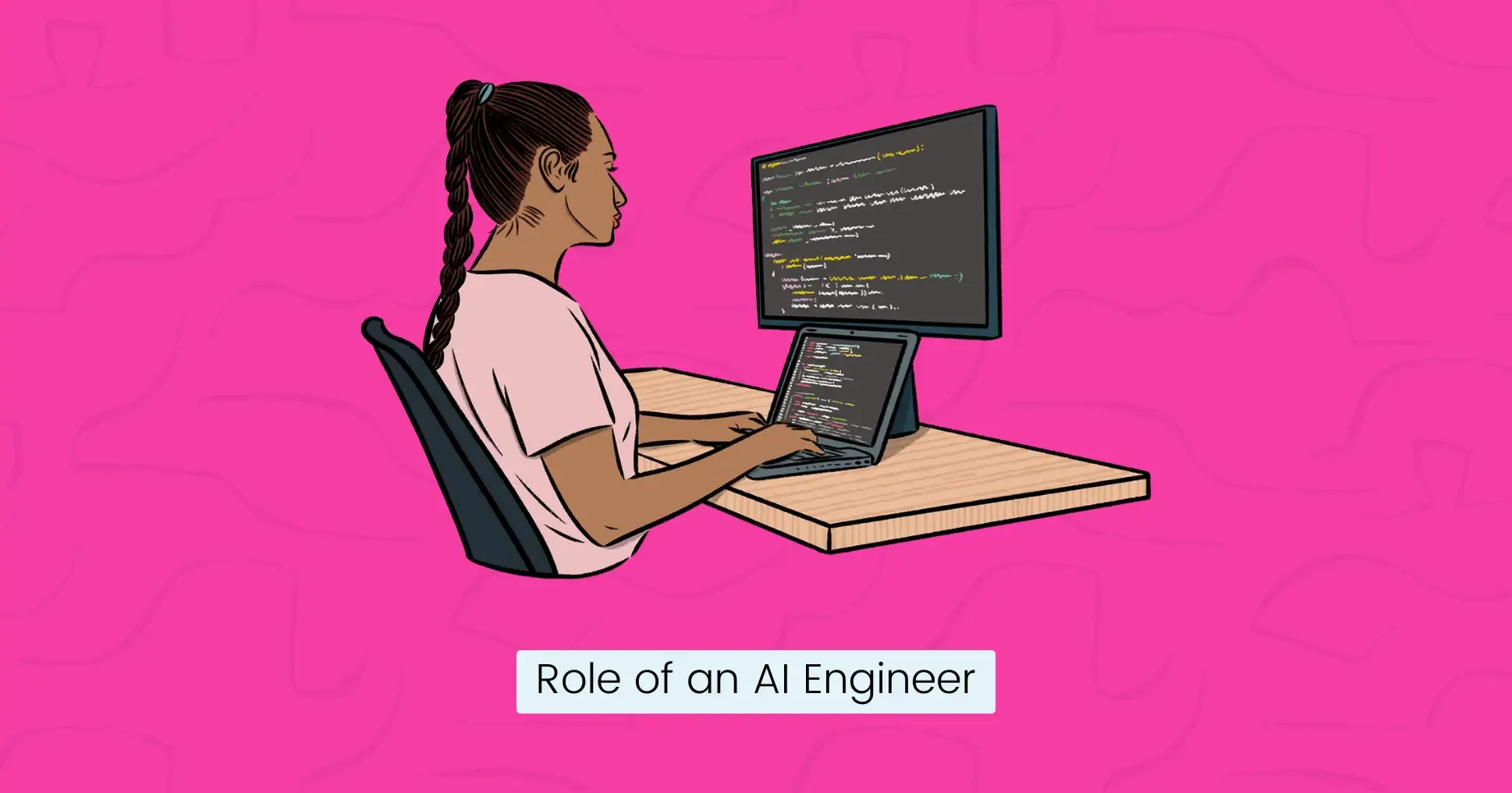
AI engineers are responsible for developing and implementing AI applications and systems.
They collaborate with multidisciplinary teams to define and solve complex problems using AI techniques.
Their responsibilities may include:
- Computer programming.
- Working with data and algorithms.
- Applying machine learning models.
- Designing deep learning applications.
AI engineers work on various projects, from developing AI models from scratch to integrating AI technologies into existing software systems.
They may also research to explore new areas of AI development or apply AI techniques to specific industries or domains.
The role of an AI engineer requires a sound understanding of software development principles, proficiency in programming languages and algorithms, and the ability to work with large datasets.
Technical Skills for AI Engineers
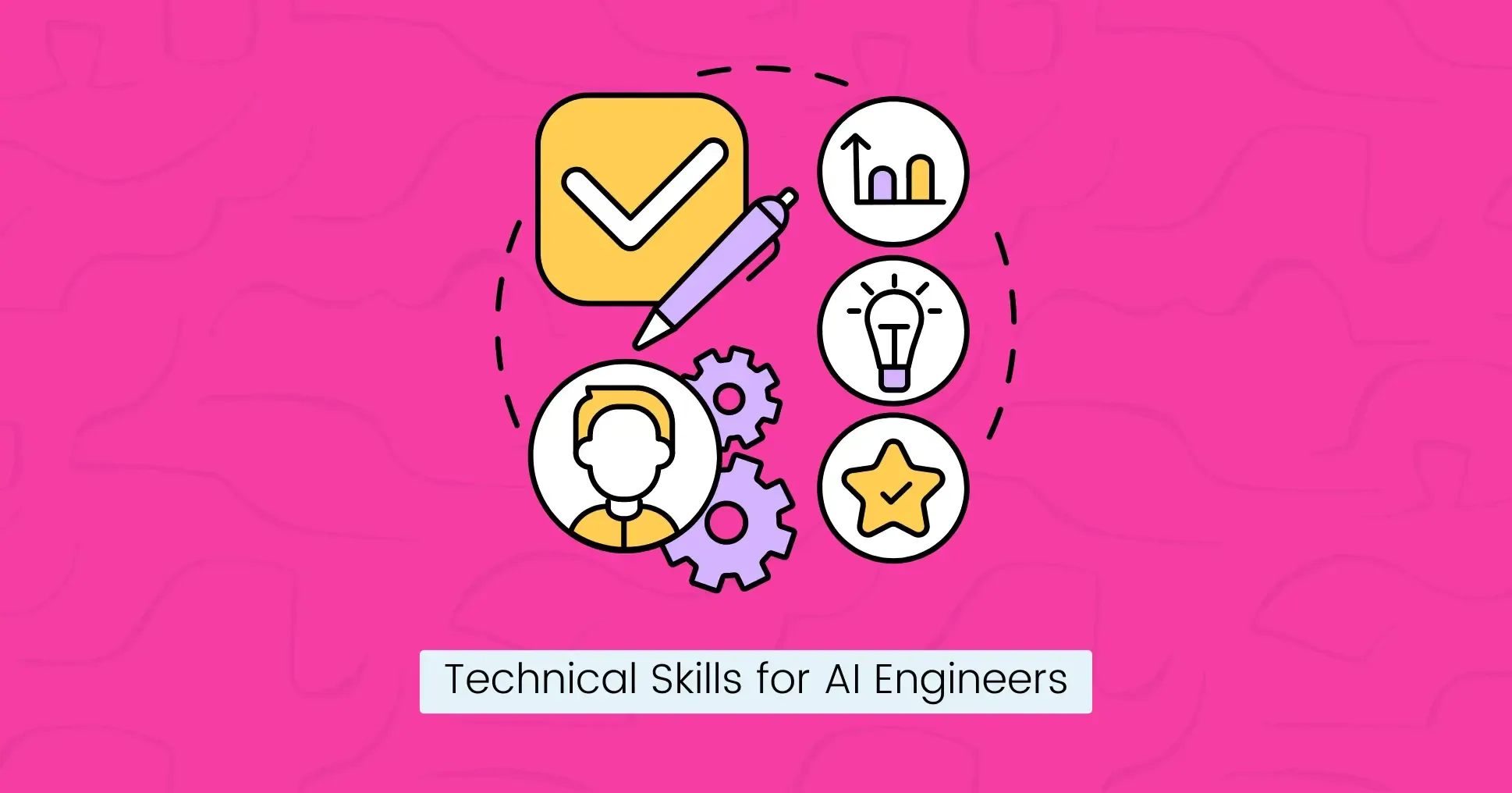
To excel as an AI engineer, there are several core technical skills that you should develop:
- Strong knowledge of data structures, algorithms, mathematics, linear algebra, and statistics
- Programming Languages (Python, R, JavaScript, C++ and Java)
- Understanding of machine learning concepts and algorithms
- Familiarity with neural networks and deep learning techniques
- Experience with data manipulation and analysis using libraries like pandas and NumPy
- Knowledge of big data technologies such as Apache Spark and Hadoop
- Ability to implement and optimize machine learning models
- Understanding of computer vision techniques and image processing algorithms
- Proficiency in natural language processing (NLP) for text analysis and language understanding
These technical skills are essential for building AI applications and working with large datasets.
Tip: Read this guide to improve your technical skills as a developer.
Soft Skills That Make a Difference
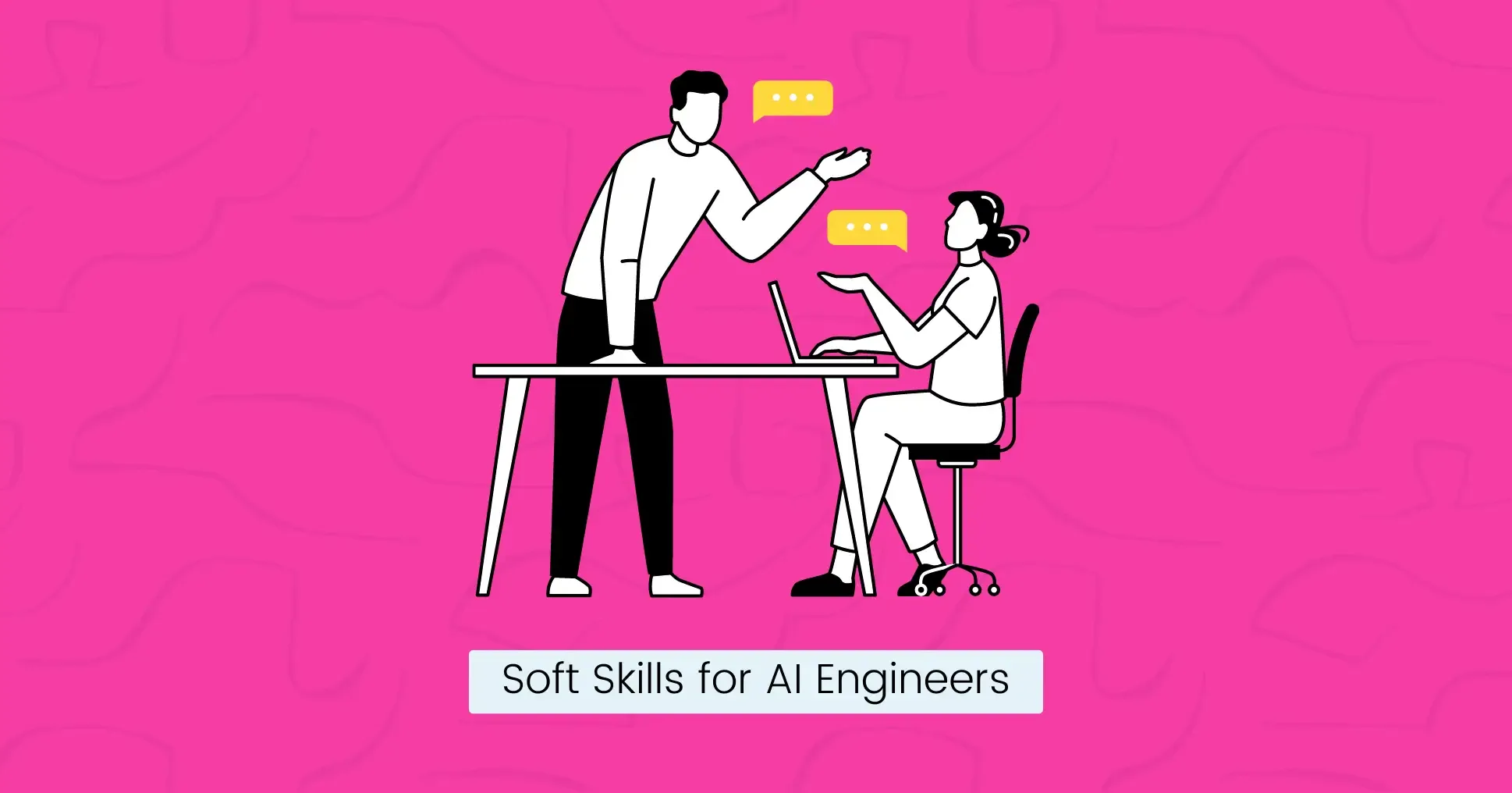
Soft skills play a vital role in the success of an AI engineer. Some essential soft skills for aspiring AI engineers include:
- Effective communication skills to collaborate with multidisciplinary teams and stakeholders
- Strong problem-solving abilities to tackle complex AI challenges
- Business insights to understand the impact of AI organizations
- Adaptability and flexibility to keep pace with the rapidly evolving field
- Teamwork and collaboration to work effectively in cross-functional teams
- Dependability and attention to detail to ensure the accuracy and reliability of AI models
- Leadership qualities to drive AI initiatives and projects
- Analytical thinking and creativity to approach AI problems from different angles
These soft skills complement the technical skills of an AI engineer and contribute to their overall effectiveness in the field.
Developing these skills will make you a well-rounded AI engineer and enhance your career prospects.
Starting Point in AI Engineering
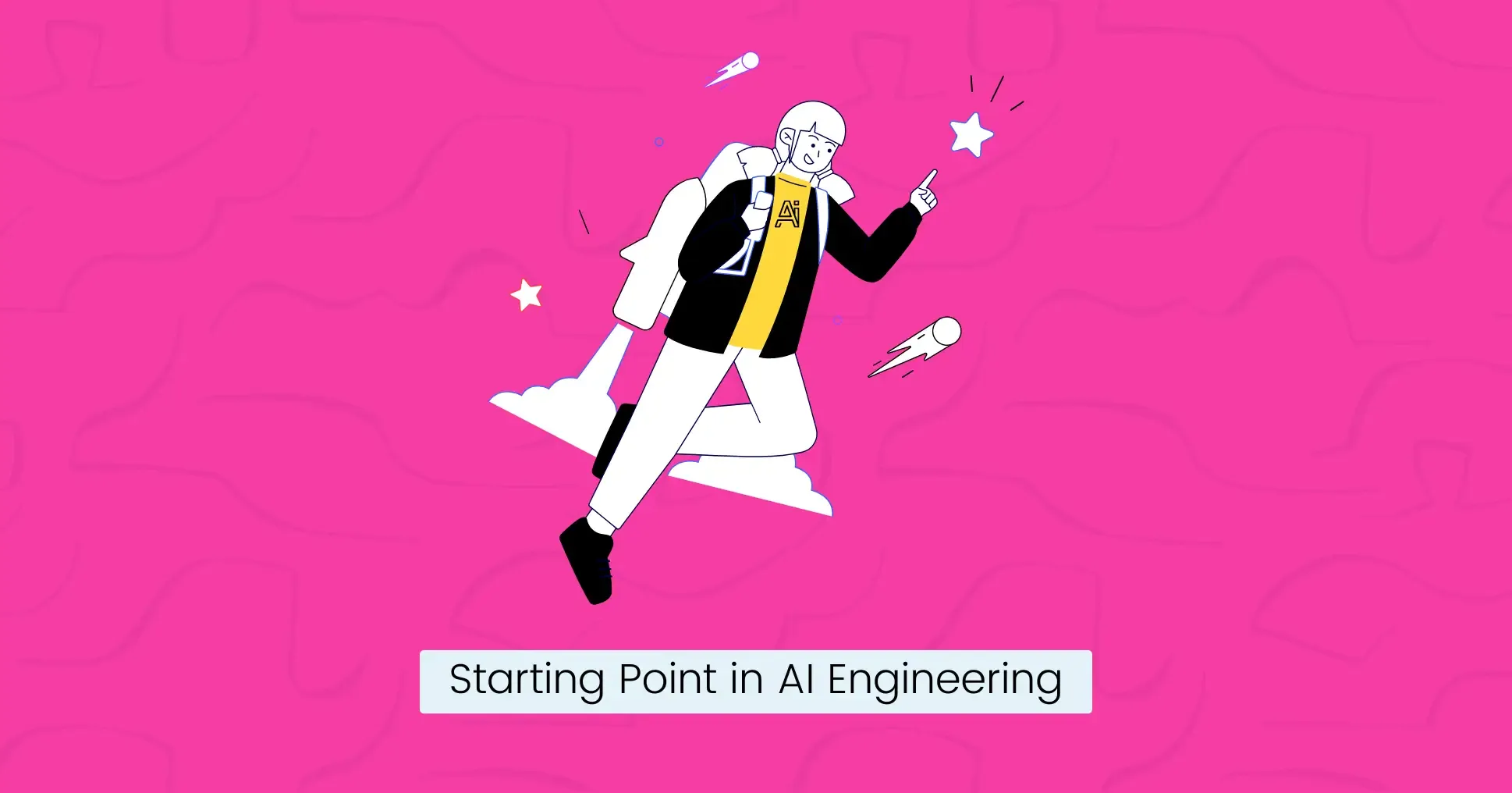
To get started in AI engineering, you need a strong motivation to learn and a willingness to acquire new skills. Here are a few things you need to get started:
- Self-learning mindset: AI engineering requires continuous learning and up-to-date with the latest field developments.
- AI community: Join online forums, attend meetups, and participate in hackathons to connect with like-minded individuals and learn from experts.
- New skills: Develop proficiency in programming languages like Python, learn about machine learning algorithms and neural networks, and gain hands-on experience with data manipulation and analysis.
Engaging in the AI community and continuously learning and acquiring new skills can prepare you for a successful career in AI engineering, and starting with an AI trainer role could be a great way to gain valuable experience.
Step 1: Self-Learning
Self-learning is an excellent starting point for developing AI skills. Here are some recommended platforms to consider:
- Udemy
- Edx
- Coursera
- 365datascience
- Datacamp
You can also read books, but ensure the content is up-to-date and applicable to modern fields.
Tip: In self-learning, the Feynman learning technique is extremely useful for learning fast. It can help you to become a 10x developer in months instead of years.
Step 2: Build Practical Projects
Building practical projects is essential for gaining hands-on experience and showcasing your abilities as an AI engineer. Here are a few project ideas to consider:
- Develop a chatbot using natural language processing (NLP) techniques.
- Build a recommendation system using collaborative filtering or content-based techniques.
- Create an image recognition system using computer vision algorithms.
- Develop a sentiment analysis model for analyzing customer reviews.
- Implement a machine learning model to predict stock prices.
- Build a speech recognition system using deep learning techniques.
You can also explore the latest AI models from OpenAI, Facebook, and Google.
Tip: Read the best artificial intelligence platforms to explore existing AI models and technologies.
Step 3: Networking and Community Involvement
Networking and community involvement are crucial for expanding your professional network and exploring career opportunities in AI engineering.
Here are a few ways to get involved:
- Join online forums and communities dedicated to AI engineering, such as Kaggle and GitHub, to connect with professionals and learn from their experiences.
- Attend industry events, conferences, and meetups to network with experts and stay updated on the latest trends and advancements in AI.
- Participate in hackathons and competitions to showcase your skills and collaborate with peers on AI projects.
- Contribute to open-source AI projects to gain recognition and build your reputation in the AI community.
- Engaging with AI professionals on social media platforms like LinkedIn and Twitter to stay connected and informed.
Networking and community involvement can provide valuable insights, mentorship opportunities, and potential job leads in the AI field.
Step 4: Gain Experience Through Internships or Freelancing
Gaining practical experience is essential for sharpening your skills as an AI engineer. Consider the following options to gain experience:
- Look for internships at AI-focused companies or research institutions to gain real-world experience and learn from industry professionals.
- Offer your AI engineering services on platforms like Upwork or Freelancer to work on real projects and build your skills.
- Offer your AI expertise to non-profit organizations or open-source projects to contribute to the community and gain experience.
Gaining hands-on experience through internships, freelancing, or volunteer work will enhance your skills and make you a more competitive candidate in the job market.
Step 5: Create a Compelling AI Engineer Resume
A well-crafted resume is essential for landing a job as an AI engineer. It should highlight your relevant skills, experience, and education.
Here are some key points to consider when crafting your AI engineer resume:
- Start with a clear and concise job title reflecting your AI engineering expertise.
- List your technical skills, including programming languages, machine learning algorithms, and data analysis tools.
- Include any relevant certifications or online courses you have completed in AI engineering.
- Highlight your experience working on AI projects or handling AI-related tasks in previous roles.
- Showcase your problem-solving abilities and critical thinking skills essential for AI engineering.
- Consider including any research or publications related to AI that you have contributed to.
Remember to customize your resume to each job application, emphasizing the skills and experiences most relevant to the role you are applying for.
snappify will help you to create
stunning presentations and videos.
Final Words
You learned that Becoming an AI engineer without a degree is achievable.
Every technical field requires dedication and willingness to learn more. Keeping up to date is crucial to becoming a great engineer.
It’s important to study tools that use AI, as it will help your mind expand further.
We created a list of AI tools that help developers in their work. You can also consider reading AI tools for technical writing.
FAQs:
How Long Does It Take to Become an AI Engineer?
The time it takes to become an AI engineer depends on an individual’s background, learning pace, and level of dedication. Developing the necessary skills and knowledge through self-learning, online courses, and practical experience typically takes several months to a few years.
What's the difference between an AI Engineer and an ML Engineer?
An AI Engineer designs systems that can perform tasks usually requiring human intelligence. An ML Engineer focuses on creating algorithms and models that allow machines to learn from data.
What is the average AI Engineer's salary?
The average salary of an AI engineer depends on factors such as experience, location, and industry. However, AI engineers typically earn competitive salaries due to the high demand and specialized skills required for the role.
